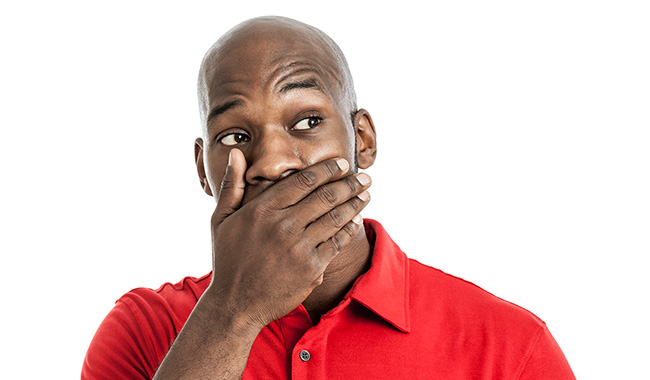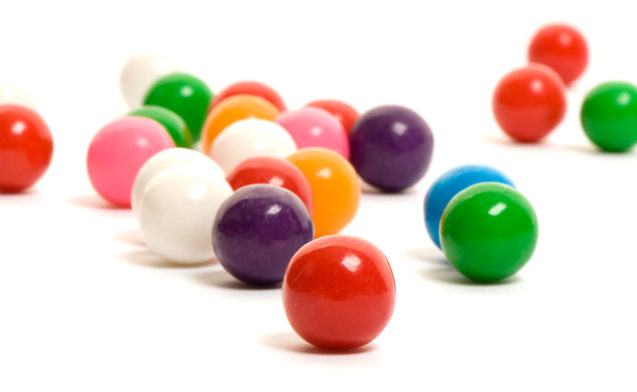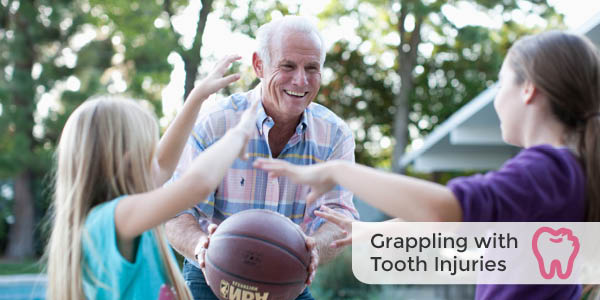Last month, we looked at foods and drinks that can stain your teeth, but whiteness isn’t the only measure of healthy teeth. There are lots of foods that can chip your teeth or damage dental work in your mouth when you eat them. What are some of these problem foods? Your Lancaster, CA dentist can warn you about some of the biggest culprits when it comes to chipped teeth, loose fillings, and broken crowns.
Ice
On a hot summer day, it’s great to fill a tall glass with ice and pour in some soda, lemonade, or tea to help cool down. You’re right if you assume that sugary drinks are bad for your teeth (they are!), but they’re bad in an over-the-long-term kind of way. In fact, lemonade and soda are also quite acidic, which isn’t good for your tooth enamel, either. However, it’s the ice that can actually chip your teeth if you chew it. Other hard foods can damage your teeth, too, so be careful when you’re eating things like baguettes, hard pretzels, and biscotti.
Popcorn
Lots of people enjoy buttered popcorn while sitting in a cool, air-conditioned movie theater, but unpopped kernels can definitely ruin the fun. They’re hard enough to chip a tooth if you crunch down on one of them by accident or on purpose. However, popcorn actually poses a double threat. The thin shell that covers the kernel can actually get stuck between your teeth or between your tooth and gum, giving bacteria a source of food and promoting tooth decay.
Fruits with pits
What do olives, cherries, dates, and peaches all have in common? They all have pits, of course, and those pits can damage teeth. If you accidentally bite into a pit, you can definitely crack or loosen a crown—or damage regular tooth enamel.
Candy
Pretty much every type of candy can damage your teeth. Hard candies can chip teeth if you bite on them or chew them up; if you suck on them and let them dissolve slowly, you’re basically giving your teeth (and the bacteria in your mouth) a sugar bath. Chewy candies, like caramels or taffy, can stick to your teeth, increasing the risk of cavities, or stick to fillings and crowns, loosening them.
But sour candies are probably the most damaging of all because they combine three dangers to your teeth all in one. They’re loaded with sugar and they stick to your teeth, but the sour flavor actually comes from acids, which eat away at tooth enamel.
You’re probably noticing a theme by now. Hard foods can damage your teeth. We’re not trying to you away from enjoying the sorts of treats you love. However, if you’re eating something that could chip your teeth, pay attention while you’re eating it. If you’re eating something that could damage your teeth in another way, remember to drink some water to rinse out sugars and acids. And always brush your teeth and floss after you’ve eaten any of the foods on this list.
If you’ve damaged a tooth or lost a filling because of something you ate, give your Lancaster, CA dentist a call at 661.952.7865 to make an emergency appointment. Come on in, and we can get your damaged tooth fixed right away!
More

There is nothing worse than feeling the pain of a toothache creep into your mouth. In honor of National Toothache Day (February 9th), let us delve into toothache symptoms, what it could mean, and some things you can do to help with pain, as well as prevent toothaches from happening.
Symptoms
Since a toothache is a common problem, it comes with a lot of symptoms too. Some of these include:
- Throbbing pain
- Sharp pain
- Pain when pressure is applied
- Pain when exposed to hot or cold temperatures
If any of these symptoms last longer than 1-2 days, it’s time to see your dentist for further examination.
Causes
Unfortunately, it can be hard to pinpoint what’s causing your toothache since so many issues can cause them.
Tooth Decay and cavities are very common. When you eat foods, especially ones that have a lot of sugar, you’re feeding the bacteria in your mouth. As the bacteria eat, they produce acid, which damages tooth enamel. Typically, you won’t feel pain until the acid eats past your enamel and reaches the nerves underneath. If you are to the point where you feel pain, you will most likely need a filling, crown, or root canal (depending on the amount of damage).
How to Prevent Cavities
- Avoid sugary foods. One of the best solutions is to not give the bacteria what they want. Avoiding foods that are sugary or made of simple carbohydrates will give them less fuel to create the acid that damages your teeth.
- Use products that have fluoride. Most toothpastes already contain fluoride, and you can top off your dental hygiene routine by rinsing with a fluoride mouthwash. Fluoride can even help rebuild lost enamel caused by tooth decay.
- Brush and floss daily. This prevents plaque from turning into tartar, which causes tooth decay and gum disease (gingivitis). Additionally, visit your dentist to keep up with your routine teeth cleanings.
Bruxism/Teeth Grinding:
Bruxism (clenching or grinding your teeth) can damage your teeth. You might be experiencing bruxism if you have sore teeth; a sore or swollen jaw; significant tooth wear; or find yourself clenching your teeth without having been aware of doing so. If you have these symptoms, there a few things you can to do help prevent this from continuing.
- Get fitted with a night guard. Your dentist can diagnose that you grind your teeth while you sleep, and prescribe the proper type of mouth protection to prevent pain and damage to your teeth.
- Adjust your bite. Your bite may be causing only certain teeth to touch, putting more strain on those particular spots. Further examination by your dentist will determine what actions need to be taken from there.
- Relax! Stress can play a huge factor in clenching your teeth. See our previous blog post for more information on this subject.
Cracked tooth or missing filling:
Cracked teeth—or a lost filling or crown—can expose the inner tooth pulp to irritation by food and hot or cold temperatures. If left untreated for too long, cracks can grow, creating a split tooth and making a fix unlikely. To avoid cracked teeth, follow these tips:
- Don’t chew on hard foods, like ice cubes, hard candies, or other objects like pens or jewelry.
- Wear mouth protection when playing physical sports.
If you notice a crack or missing hardware, set up a time to visit your doctor as soon as possible to prevent any further damage. Until you can see your dentist, there are few things you can do to help with the pain. One option is to take over-the-counter anti-inflammatory medicines like ibuprofen or acetaminophen. (Always read the directions to ensure you are able to take it!) You can also put clove oil on a cotton swab and apply it to the affected area. Apply a cold press if you notice swelling. Remember, these are just temporary solutions to your pain, and you will need to go to your dentist if the pain persists for more than 1-2 days.
More
By admin
17 Feb, 2016
Dental Tips, General Dentistry, General Health, Lifestyle
chipped tooth, cracked tooth, dental emergency, dental injury, dental mouthguard, dental tips, fractured tooth, sport mouthguards, tooth loss
This time of year the weather shifts to longer, warmer, and brighter days allowing families who have been in hibernating to begin enjoying some of their favorite outdoor activities again. From hiking and biking to actively engaging in sports like baseball and soccer, the fun factor is high and so is the opportunity for dental disasters.
There are many ways to protect you and your children’s teeth while enjoying the active side of life. Mouth guards and helmets are a must, but even with the best precautions in place, that unexpected spill from a bike or a missed footstep on the trail can quickly lead to a dental emergency. While you can’t predict when a dental emergency will happen the following tips will help you navigate every thing from a broken tooth to damaged orthodontics so you can get back to enjoying your springtime fun in no time at all.
- Knocked-Out Tooth: Rinse the tooth carefully, making sure not to wash away any remaining tissue. Attempt to place the tooth back in its socket carefully. If this is not possible, place it in a container of milk, or water with a pinch of table salt. Call your emergency dentist immediately. Your tooth has the best chance of being saved if you are seen within an hour of having it knocked out.
- Chipped, Cracked, and Broken Teeth: Gather and rinse all broken pieces of the tooth. Rinse your mouth with warm water and apply gauze if there is bleeding. Use a cold compress to relieve pain and swelling in the injured area, and contact your emergency dentist to be seen immediately.
- Fractured Tooth: Dentists can easily fix fractures with a composite restoration. A dentist should be seen within a couple days of the injury.
- Partially Dislodged Tooth: When a tooth gets pushed out of its proper position, it is important to manage the pain and get into your emergency dentist immediately. Apply a cold compress to the area and take a pain reliever such as acetaminophen or ibuprofen as needed.
- Lost or Broken Crown: Save your crown and set up an appointment with your emergency dentist right away. If possible, use over-the-counter dental cement to reattach the crown. If there is any pain, take an over-the-counter pain reliever such as ibuprofen or acetaminophen. Clove oil can also be used to soothe sensitive areas.
- Broken Braces: Orthodontic wax can be used to cover or temporarily reattach loose brackets and broken wires. If a broken wire is poking out and into your cheek or tongue, use the eraser end of a pencil to move it into a comfortable position, then cover it with wax, gauze, or cotton. See your orthodontist to have your braces repaired.
- Soft-Tissue Injuries: Tears, punctures, and lacerations to the soft tissues of the cheek, lips, or tongue should be cleaned and packed with gauze. A trip to the emergency room is necessary if stitches are needed.
If you or your children are considering joining a full-contact sport, preparing for a dental emergency is key to preventing tooth loss.
The following are a couple of items and information to have on hand:
- Dentist’s phone number and email address
- Small, portable container for dental emergency kit
- Saline solution
- Tissue
- Gauze
- Orthodontic wax
- Dental cement
- Compress
- Ibuprofen and/or acetaminophen
Finally, one of the most important steps you can take toward protecting your smile in any sports-related activities is talking to your dentist about a mouthguard. According to the American Dental Association, sport mouthguards have been shown to reduce the risk of sport-related dental injuries. Having a dental provider fit you with one that is resilient, comfortable, and durable could mean the difference between keeping or losing your teeth in a sports-related incident.
To find out more about mouthgaurds and protecting your teeth, call your Lancaster dentist today at (661) 952-7865.
More
By admin
24 Aug, 2015
Dental Emergency, Dental Tips, General Dentistry, General Health, Lifestyle, Preventive Dental Care
anxiety, broken tooth, chipped tooth, cracked tooth, lost tooth, nutrition, oral hygiene, plaque, smoking, stress, tooth decay, tooth loss, tooth trauma
It’s a beautiful summer day outside. You are walking through a park when, out of nowhere, a levitating bowl full of giant pinwheel lollipops appears in front of you. You reach for a particularly colorful one and take a huge chomp out of it. Suddenly, clouds fill the sky and shards of the lollipop fall from your mouth. You look down only to realize it’s your teeth that have all fallen to the ground instead!
Sound like a familiar nightmare? Bad dreams about tooth loss are not uncommon, and neither is the fear of losing your teeth as you age. While it can happen, tooth loss isn’t inevitable. There are certain avoidable conditions that lead to it, and if tooth loss does occur, there are some amazing solutions — like dental implants — that can restore your natural-looking smile to its original state.
Are You at Risk for Tooth Loss?
Tooth loss is not a natural occurrence. The following are some common circumstances that most often lead to the loss of a tooth or teeth.
Tooth trauma: One of the most common causes of tooth loss is trauma caused by impact or unexpected contact with a hard surface. Breaking, chipping, and cracking that leads to a tooth needing to be removed can be caused by a fall, getting hit with a bat or ball while playing sports, or biting down on a hard object, like a hidden seed or shell.
The use of teeth as a tool is another example of how trauma can lead to a tooth extraction. Avoid activities like removing caps, tearing tags, and cutting threads with your teeth. There are tools that are made for these types of jobs, so you can avoid damaging your teeth.
Disease: Poor oral hygiene and nutrition cause the buildup of plaque and tooth decay that leads to periodontal disease. Preserving your teeth means more than just brushing twice a day and flossing; it means taking care of your whole health. You need to maintain a balanced diet, moderate or eliminate activities like drinking alcoholic beverages, and get to those routine dental visits. Periodontal disease doesn’t just put you at risk for tooth loss — it puts your whole health at risk.
Stress and anxiety: Stress and anxiety are detrimental to many aspects of your health, including your teeth. It can cause you to clench your jaw and grind your teeth during the day, as well as in your sleep. There are many stress-relief techniques such as breathing exercises, yoga, and meditation that can help. You should also talk to your dental provider about being evaluated for a bite guard to protect you from nighttime clenching and grinding.
Smoking: Everyone knows that smoking is bad for your lungs and your heart, but people don’t realize that it also increases the likelihood of tooth loss. It affects the blood supply to your gums and increases the occurrence and severity of periodontal disease. The risks of tooth loss increase with both traditional and smokeless cigarettes.
The bottom line is that the key to keeping your teeth throughout your lifetime is taking care of your whole health. If tooth loss does occur, don’t despair: Your provider has solutions available that can restore your smile. From tooth implants to a variety of denture options, there is a natural-looking option perfect for you.
To find out more about how to maintain your natural smile, call the office of Dr. Doug Weber today at (661) 952-7865.
More
By admin
04 Mar, 2015
Dental Emergency, Dental Tips, General Dentistry, Orthodontics
broken braces, broken crown, broken tooth, cracked tooth, dental emergency, lost crown, lost tooth
This time of year the weather shifts to longer, warmer, and brighter days, allowing families that have been in hibernation to begin enjoying some of their favorite outdoor activities again. From hiking and biking to actively engaging in sports like baseball and soccer, the fun factor is high — and so is the opportunity for dental disasters.
There are many ways to protect your and your children’s teeth while enjoying the active side of life. Mouthguards and helmets are a must, but even with the best precautions in place, that unexpected spill from a bike or a missed footstep on the trail can quickly lead to a dental emergency. While you can’t predict when a dental emergency will happen, the following tips will help you navigate everything from a broken tooth to damaged orthodontics, so that you can get back to enjoying your springtime fun in no time at all.
Knocked-Out Tooth: Rinse the tooth carefully, making sure not to wash away any remaining tissue. Attempt to place the tooth back in its socket carefully. If this is not possible, place it in a container of milk or water with a pinch of table salt. Call Lancaster emergency dentist Dr. Douglas Weber immediately. Your tooth has the best chance of being saved if you are seen within an hour of having it knocked out.
Chipped, Cracked, or Broken Tooth: Gather and rinse all broken pieces of the tooth. Rinse your mouth with warm water, and apply gauze if there is bleeding. Use a cold compress to relieve pain and swelling in the injured area, and contact your emergency dentist Dr. Weber about being seen immediately.
Partially Dislodged Tooth: When a tooth gets pushed out of its proper position, it is important to manage the pain and get into your emergency dentist immediately. Apply a cold compress to the area, and take a pain reliever such as Tylenol or Advil as needed.
Lost or Broken Crown: Save your crown and set up an appointment with your Lancaster emergency dentist Dr. Douglas Weber right away. If possible, use over-the-counter dental cement to reattach the crown. If there is any pain, take an over-the-counter pain reliever such as Advil or Tylenol. Clove oil can also be used to soothe sensitive areas.
Broken Braces: Orthodontic wax can be used to cover or temporarily reattach loose brackets and broken wires. If a broken wire is poking out and into your cheek or tongue, use the eraser end of a pencil to move it into a comfortable position, then cover it with wax, gauze, or cotton. See your orthodontist to have your braces repaired.
Preparing for Dental Emergencies
Now that you know how best to react to preserve your smile in the worst-case scenarios, here are a few items to have on hand:
- Dentist’s phone number and email address
- Small, portable container for dental emergency kit
- Saline solution
- Tissue
- Gauze
- Orthodontic wax
- Dental cement
- Compress
- Ibuprofen and/or Tylenol
For more information on how to handle a specific dental emergency, or for immediate help, contact Lancaster emergency dentist Dr. Doug Weber at (661) 952-7865.
More





